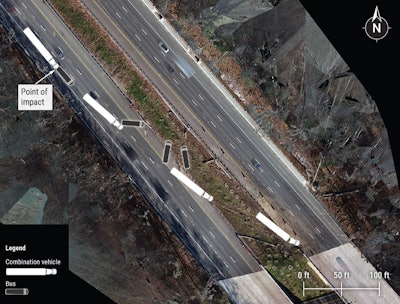Trucking news and briefs for Friday, Aug. 30, 2024:
NTSB recommends stronger ELD regs after fatal truck-bus crash investigation
Following an investigation of a fatal crash involving a tractor-trailer and a bus in Williamsburg, Virginia, the National Transportation Safety Board is calling for stronger ELD regulations, the finalization of an automatic emergency braking system mandate for trucks and more.
The crash occurred on Dec. 16, 2022, when a truck operated by a driver of Illinois-based Triton Logistics, collided with the rear of a slower-moving bus, operated by Futrell’s Party Adventures, on I-64, according NTSB’s report. The bus was traveling at 20-25 mph in the right lane, and the truck was going 65-70 mph with the cruise control set. The truck driver did not brake or take any evasive action, NTSB added.
Three bus occupants were killed in the crash, nine sustained serious injuries and 11 sustained minor injuries. The truck driver also sustained serious injuries.
 This image depicts the post-impact paths of travel for the truck and bus relative to physical evidence, NTSB said.NTSB
This image depicts the post-impact paths of travel for the truck and bus relative to physical evidence, NTSB said.NTSB
While the report did lay partial blame on the bus company’s safety management and maintenance practices, most of the investigators’ findings revolved around driver fatigue and violations of hours-of-service regulations on the part of Triton.
NTSB said the bus’s slow speed, which “could have been due, in part, to the partially blocked prescreen fuel filter … increased the severity of the rear-impact collision,” the report states.
However, investigators determined that the probable cause of the crash “was the truck driver’s fatigue, due to excessive driving time and limited sleep opportunity, which resulted in his lack of response to the slow-moving bus ahead.” Contributing to the driver’s fatigue was Triton, “which created fictitious driver accounts in the electronic logging device system and enabled drivers to operate their vehicles for hours in excess of federal regulations,” NTSB’s report added.
NTSB made the following safety recommendations as a result of its investigation:
- For the Federal Motor Carrier Safety Administration to revise its ELD regulations to require ELD providers to create an audit log that includes the date, driver login time and who logged them in, names of anyone who edited the log, driver’s license numbers, and active driver list changes.
- For the Commonwealth of Virginia to provide new interstate motor carriers with management safety guidance.
- For Triton Logistics to implement a process to regularly verify the accuracy of drivers’ records of duty status, such as by cross-referencing other information, such as payroll.
- For Triton to implement a fatigue management program.
- For Triton to implement a policy to proactively use onboard video event recorder information, including inward- and forward-facing video, to enhance driver training/coaching.
NTSB also reiterated previous safety recommendations for the National Highway Traffic Safety Administration to finalize a rulemaking for forward collision avoidance systems in commercial vehicles and to require that all trucks and buses over 10,000 pounds GVWR be equipped with onboard video event recorders.
Cummins using Allison test center for testing
Cummins and Allison Transmission announced Thursday that Cummins will use Allison’s Vehicle Electrification + Environmental Test Center to conduct a series of tests on multiple trucks equipped with Cummins powertrains.
The 60,000-square-foot facility is the only one of its kind in the Midwest, designed to facilitate year-round testing in a controlled environment, Allison said. The facility supports a wide range of vehicle testing, including those powered by diesel, gasoline, natural gas, hydrogen and battery-electric systems. Its capabilities are essential for OEMs and suppliers who aim to reduce product development and validation timelines, ensuring that new technologies can be brought to market swiftly and efficiently.
“We are thrilled to leverage the advanced testing capabilities of Allison’s Vehicle Electrification + Environmental Test Center to further enhance our product development efforts,” said Tom Marsh, X15 Program Leader, Cummins. “The facility’s ability to simulate real-world conditions in a secure and repeatable environment is invaluable as we continue to innovate and improve our powertrain technologies.”
The testing facility’s controlled thermal environments and dynamometer road simulations can replicate a broad range of duty cycles, offering the ability to test vehicle performance under various extreme conditions. This not only enhances the reliability of results but also reduces costs compared to on-road testing.
Trucking Cares Foundation donates $40K to training organization
The Trucking Cares Foundation donated $40,000 to the Next Generation in Trucking Foundation, a nonprofit dedicated to engaging and training the next generation of trucking industry professionals.
The grant will be used to develop TruckFit and incorporate it into CDL training curriculums that the organization provides to high schools, community/technical colleges, and private schools around North America. The TruckFit fitness course instructs new drivers on how to prioritize their physical and mental health while on the road.
“The Next Generation in Trucking Foundation equips individuals with skills that will open the door of opportunity to more young people seeking economic independence in the trucking industry,” said Phil Byrd, chairman of the Trucking Cares Foundation. “Through this donation, the Trucking Cares Foundation hopes to support this organization’s noble mission as well as promote healthy and active lifestyles so that new drivers can sustain these rewarding careers for the long haul.”












